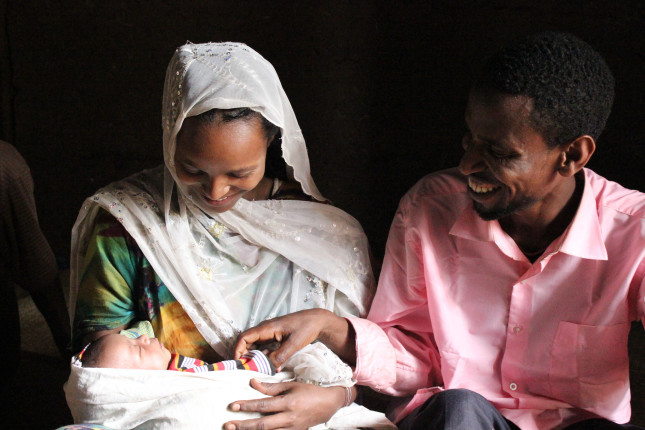-
The Crisis of Perinatal Mental Health Requires Collaborative Solutions
October 26, 2022 By Alyssa Kumler
While a great deal of focus on risks to women’s health just before and after giving birth centers on physical wellbeing, Rebecca Levine, Senior Maternal Health Advisor with the U.S. Agency for International Development (USAID), observed that we may be missing a key part of the picture.
“Many are unaware that common perinatal mental health disorders – such as anxiety and depression – are the leading complication of pregnancy and childbirth globally,” said Levine at a recent event hosted by USAID’s MOMENTUM Country and Global Leadership on global resources for Perinatal Mental Health (PMH). She added that USAID recognizes that healthy women and families are the cornerstone of an enduring and prosperous society; and USAID decided to play a key role internationally by elevating perinatal mental health as a strategic priority for increased focus and investment for the coming years.
Leaders and experts shared a global Theory of Change on PMH developed through collaboration and synthesis of existing data at the event. This work was a key part of larger efforts to support the de-stigmatization of perinatal mental health broadly and help to build an evidence base of interventions for scale, said Levine.
A Widespread Problem
Jane Fisher, Professor of Global Health at Monash University, offered a detailed view of the commonality of perinatal mental health disorders like depression, anxiety, and post-traumatic stress disorders—all of which can impact daily functioning. She noted that in high income countries, one in ten women who are pregnant experience these conditions, and added that estimates of the same figures in low-middle-income-countries are much higher. “The prevalence increases as the country’s socioeconomic status decreases and the highest prevalence is in countries affected by humanitarian conflict as well as poverty,” said Fischer.
What is currently being done to address perinatal mental health for women in these countries? Many programs have had positive results for both mothers and their children, but the issue is bringing these to scale and sustaining them, said Shanon McNab, Senior Technical Advisor at MOMENTUM Country and Global Leadership. The broader crisis of perinatal mental health, she continued, meant that “there was a call to do something in a more collective, collaborative way.”
More than 700 global stakeholders put forth a collaborative vision at the first ever technical consultation on PMH in 2021. Building on work from that consultation, the Perinatal Mental Health Theory of Change was developed using a “human centered design process,” said Rohan Patankar, Senior Design Researcher at Quicksand. The process involved a landscape review of existing evidence, he continued, with a series of workshops and several rounds of consultation with experts to get the final PMH Theory of Change.
How It Works
The PMH Theory of Change is a multi-layered model. Beginning at the individual level, the model ripples outward to account for the role of interpersonal relationships, the community, the service delivery ecosystem, and the policy landscape, with each layer including specific interventions and outcomes. “This [model] will give a guiding light to organizations, teams, and individuals that are working in these settings,” said Aditya Prakash, Senior Design Researcher at Quicksand.
One example of how a multi-layered approach benefits PMH programs is the Society for Pre-Post-Natal Services (SPANS) approach to perinatal mental health in Zimbabwe. “We are aware that there is a large gap in maternal mental health providers,” said Linos Muvhu, Therapist and Founder of Afro-Centric International Conference on Maternal Mental Health in Africa (ICAMMHA). “It’s essential that we’re linking perinatal mental health interventions to social determinants,” said Laura Fitzgerald, Senior Technical Advisor with MOMENTUM Country and Global Leadership. The SPANS program addresses this issue through multi-layer interventions such as community awareness, education and training, screening and prevention, and advocacy to better support PMH in Zimbabwe.
The PMH theory of change has other clear benefits as well. It provides a high-quality synthesis of the evidence and provides a clear way in which these policies can be planned, said Fisher. The collaborative aspect of the model is also beneficial and will be taken forward with addressing PMH.
“There is so much rich experience and expertise globally in this space,” said Levine. “We need to be learning from each other. We need to be listening to one another. This is not a time for feeling that we have all the answers and that there’s a silver bullet to addressing perinatal mental health. It is a complex issue, and it requires complex responses.”
Read more:
- COVID-19 was especially threatening to pregnant people’s mental health
- Community support can help mothers experiencing perinatal mental health conditions
- Pregnant people need respectful care to support their mental health
Sources: Healthy Newborn Network, JAMA Network Open, London School of Hygiene & Tropical Medicine, Maternal Mental Health Leadership Alliance, Mental Health Innovation Network, Momentum Country and Global Leadership, USAID
Photo Credit: Nefisa, a farmer who lives in the Oromia Region of Ethiopia, smiling with her husband and healthy child, courtesy of Flickr user USAID in Africa.
 A Publication of the Stimson Center.
A Publication of the Stimson Center.



